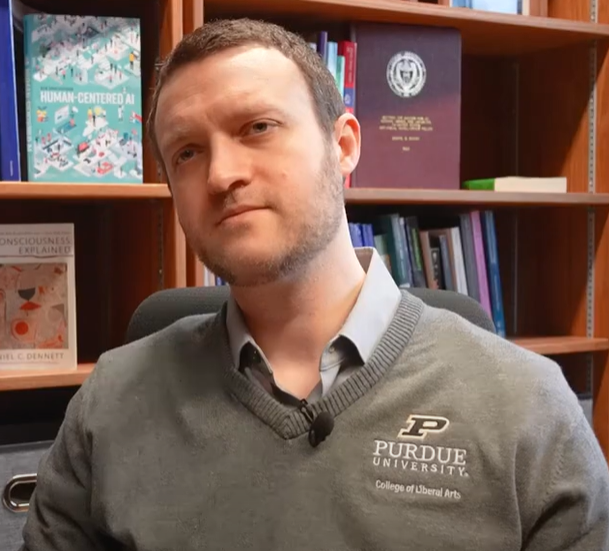Shaping AI Policy: Dr. Daniel Schiff Leads Workshop with Indiana Legislators

As a subject matter expert in technology policy and AI governance, Assistant Professor Dr. Daniel Schiff led a workshop in Indianapolis on March 18th in collaboration with the Future Caucus to explore the growing need to consider AI in policymaking. The Future Caucus is a national, nonpartisan group that works with young policymakers in a bipartisan fashion, on the federal and state level, to tackle modern day legislative issues and implement effective policies. The Indiana cohort is chaired by Rep. Beau Baird (R) and Rep. Maureen Bauer (D).
During the session, Dr. Schiff provided an overview of the national and global AI policy landscape, discussed legislative trends and key challenges facing lawmakers, and provided resources that Indiana’s legislators can utilize when upskilling themselves on AI and when developing their own policy proposals. Some of these resources were created by the center Dr. Schiff co-directs at Purdue, the Governance and Responsible AI Lab (GRAIL), housed in Purdue’s Department of Political Science in the College of Liberal Arts.
“As the AI governance landscape continues to grow and become more complex, lawmakers and policy stakeholders are increasingly seeking to be equipped to understand AI. It’s non-trivial to understand how it can be employed usefully and responsibly in domains like education, labor and workforce, and how it effects issues like elections and cybersecurity, among other priorities,” Dr. Schiff remarked. “Our researchers are empowering legislators to have these discussions, locally and nationally, through GRAIL and the recently launched Academic Alliance for AI Policy.”
Indiana in particular has seen an increasing number of legislative proposals related to AI in recent years. In 2024, Indiana lawmakers established an AI task force (SB 150) that set out to study and assess the use of AI technology by state agencies, while other recent legislation (HB 1047) has addressed deepfakes used in nonconsensual intimate imagery. Around the country, states are implementing AI legislation concerning deepfakes and misinformation, labor impacts, consumer protection, education, and healthcare, and general risk management, making it more important than ever for lawmakers to have a solid foundation in AI technology and its governance.
AI continues to evolve at a rapid pace, and understanding how the technology works, its capabilities and limits, and what role government should play in regulating and enabling it is new territory for some lawmakers. To help address this learning curve, GRAIL is filling key gaps in academic research and creating user-friendly tools and resources to help empower lawmakers. One of those resources is AGORA — the Artificial Intelligence Governance Regulatory Archive. Created by Georgetown’s Center for Security and Emerging Technology at Georgetown University and GRAIL, this database aims to organize and analyze national, state, and local legislation in the United States pertaining to AI. Additional existing toolkits available to state lawmakers include the AI Policy Toolkit and Deepfakes Database, both created by the National Council of State Legislatures (NCSL), along with sector-specific guidance curated by Schiff that discuss issues like the future of labor, education, and public sector AI adoption.
“It’s critical for academics to collaborate with policymakers to navigate these conversations as key decisions across many policy domains become more pressing, including here in Indiana,” said Schiff. “Our talented students and faculty are passionate about empowering decision-makers to think through AI policy and all the areas it affects, and it’s always a pleasure to have the chance to work with our own local legislators to bring about an AI-enabled future that provides benefits to our communities.” Read more about the training session here and about GRAIL here.